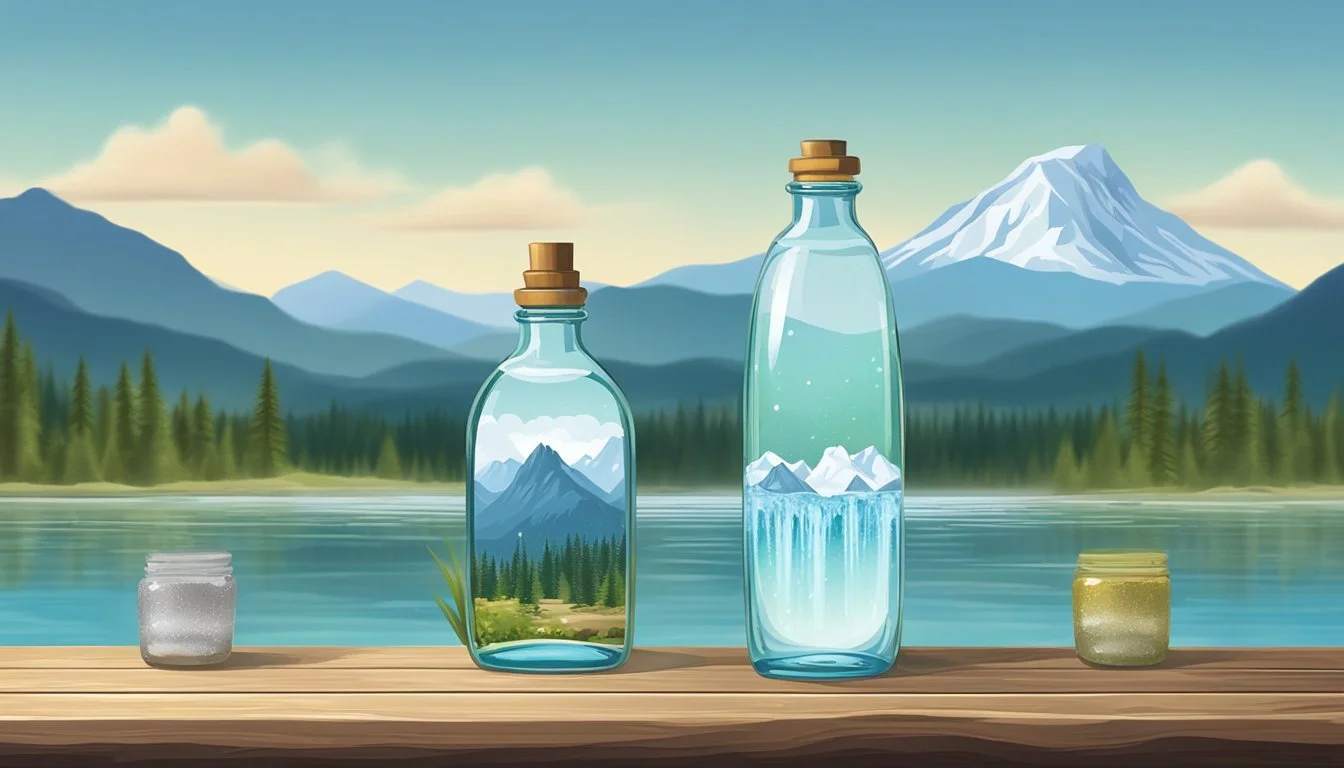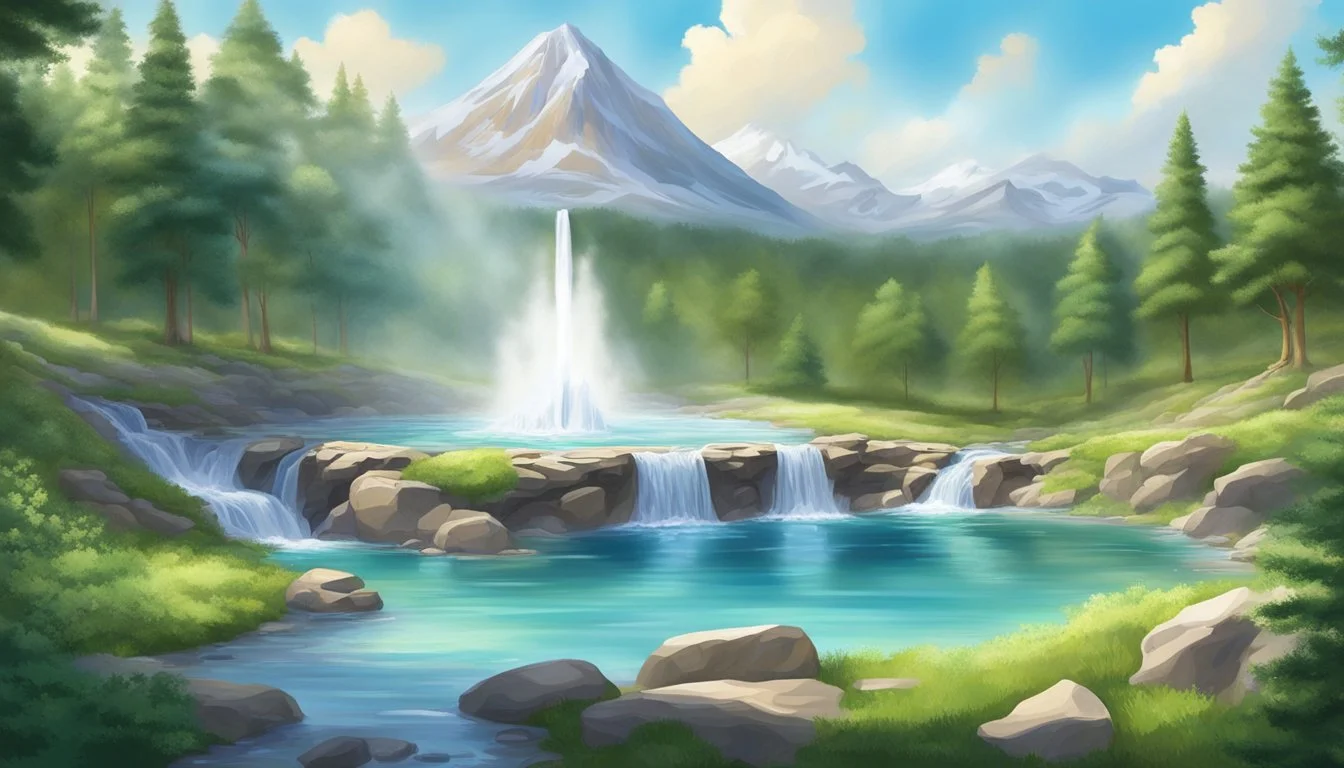Cascade Mountain vs. Crystal Geyser
Which Bottled Water Offers Superior Quality?
When it comes to bottled water, consumers often seek clarity and quality in what they are drinking. Cascade Mountain and Crystal Geyser are two popular brands often compared by those mindful of their hydration choices. While both brands promise pure and refreshing water, distinct differences set them apart in terms of taste, sourcing, and consumer reviews.
Cascade Mountain bottled water is praised for its crisp taste and minimal mineral content, appealing to those who prefer a clean and straightforward hydration experience. This brand sources its water from protected mountain springs, ensuring both purity and sustainability. Since Cascade Mountain is less well-known than some competitors, it might offer a refreshing alternative to those looking for a premium yet less mainstream option.
Conversely, Crystal Geyser has garnered mixed reviews. Critics often point out concerns regarding its overall taste and transparency in water sourcing and treatment methods. Despite this, it remains a widely accessible choice in many stores. For individuals prioritizing transparency and environmental practices, Cascade Mountain may be the more appealing choice. Readers are encouraged to weigh these factors when selecting their next bottle of water.
Exploring Bottled Water Industry
The bottled water industry has seen remarkable growth, driven by consumer demand for convenience and perceived quality. Understanding the key players, sources, and regulations helps consumers make informed choices.
Major Players and Brands
The bottled water market includes several prominent brands. Nestlé and Coca-Cola dominate with products like Nestlé Pure Life and Dasani. PepsiCo offers Aquafina, while Crystal Geyser and Fiji Water carve out niches based on distinct marketing and quality claims. Retailers also sell private-label brands, often as budget-friendly alternatives. The International Bottled Water Association (IBWA) represents industry interests, advocating for standards and practices that maintain public trust in commercial bottled waters.
Water Source and Origin
Bottled water sources vary widely. Natural spring water and spring water are often highlighted for their purity. For instance, Crystal Geyser sources from natural springs, while Fiji Water markets its unique aquifer source. Aquafina and Dasani, however, use treated tap water. The origin of the water can influence taste, mineral content, and consumer perception. Bottlers are required to disclose the water source on labels, allowing consumers to choose based on their preferences for source water quality.
Regulation and Transparency
Regulation of bottled water falls under the jurisdiction of the federal government, specifically the Food and Drug Administration (FDA). The FDA's standards are comparable to those set by the Environmental Protection Agency (EPA) for tap water, ensuring safe drinking water. Transparency is critical for consumer trust; brands provide quality reports detailing contaminant levels and compliance with safety criteria. For instance, Aquafina and Dasani offer reports on microplastics and pH levels. Public health considerations drive ongoing regulatory scrutiny, balancing industry growth with consumer safety.
Health and Hydration
Understanding the health benefits and hydration qualities of Cascade Mountain and Crystal Geyser can help consumers make an informed choice. Key aspects to consider include pH levels, alkalinity, and the presence of minerals and impurities.
pH Levels and Alkalinity
Cascade Mountain bottled water has a slightly alkaline pH, typically ranging between 7.8 and 8.2. This can help neutralize acid in the body, potentially improving overall health. Alkaline water is often sought after for its supposed benefits, including better hydration and detoxifying properties.
Crystal Geyser, on the other hand, has a neutral to slightly acidic pH, ranging from 6.8 to 7.4. While still within safe limits, water on the lower end of the pH spectrum may not provide the same alkaline benefits as Cascade Mountain. Ensuring the right pH level can enhance hydration and support metabolic functions, making it a critical consideration in water choice.
Minerals and Purity
Cascade Mountain water is sourced from natural springs and is known for its high mineral content. It contains essential minerals like calcium, magnesium, and potassium, which are beneficial for health. These minerals can aid in maintaining bone health, regulating muscle function, and ensuring proper hydration levels.
Crystal Geyser is also sourced from natural springs but undergoes less rigorous purification compared to some competitors. Concerns have been raised about potential impurities, such as heavy metals and arsenic, although these are within permissible limits. Consumers keen on purity might need to weigh these factors when making their decision.
Both brands present unique benefits related to hydration and health, dependent on their distinct characteristics in pH levels, alkalinity, and mineral content. Cascade Mountain's higher alkalinity and mineral-rich profile might appeal more to those focused on health benefits, while Crystal Geyser offers a more neutral option that's widely available.
Taste and Consumer Preferences
Taste and consumer preferences are crucial factors when comparing bottled water brands like Cascade Mountain and Crystal Geyser. This section explores the flavor profiles of each brand and examines the loyalty and reputation they hold among consumers.
Flavor Profile Comparisons
Cascade Mountain water is sourced from mountain springs, offering a clean, crisp taste with natural mineral undertones. Its flavor profile tends to be smooth and refreshing, making it a popular choice among those who prefer spring water.
Crystal Geyser, also a spring water, draws its source from an underground spring. It presents a similar clean taste but with a slightly more robust mineral presence. Some consumers find Crystal Geyser to have a slightly sweeter aftertaste compared to Cascade Mountain.
When comparing other brands, Nestlé Pure Life and Dasani fall into the purified water category. These tend to have a more neutral taste due to extensive filtration processes. Fiji Water and Evian, both under the mineral water category, offer more complex flavor profiles with heavier mineral notes, often described as silky or smooth.
Brand Loyalty and Reputation
Brand loyalty can significantly impact consumer choices. Cascade Mountain enjoys a strong reputation for its pristine sourcing and eco-friendly practices, which appeal to environmentally conscious consumers.
Crystal Geyser has built a loyal following due to its quality and affordable pricing. Despite some concerns raised in reports, it maintains a steady market presence.
Popular brands like Fiji Water and Evian are renowned for their luxury status and distinctive taste, garnering strong brand loyalty among consumers seeking premium options. Poland Spring and Dear Park cater to those who prefer reliable spring water sources and consistent taste.
Nestlé Pure Life and Dasani, widely available and recognizable, are often trusted for their consistent quality and extensive distribution. Their reputation as reliable purified water options helps maintain a broad consumer base.
These factors collectively influence consumer preferences and brand loyalty, often determining which bottled water brand stands out in a crowded market.
Environmental Impacts and Sustainability
Cascade Mountain and Crystal Geyser's environmental impacts and sustainability practices cover aspects like packaging and recycling as well as water source conservation.
Packaging and Recycling
Cascade Mountain utilizes glass bottles, which are highly recyclable and often considered more environmentally friendly compared to plastic. Glass is inert and doesn't leach chemicals into the water, making it a preferred choice for health-conscious consumers.
Crystal Geyser, on the other hand, primarily uses plastic bottles. While some varieties may incorporate recycled materials, plastic recycling is less efficient. Plastic waste frequently ends up in landfills or oceans, contributing to environmental pollution.
Boxed water is another sustainable packaging alternative, and though not widely adopted by either brand, it offers significant environmental benefits. Boxed water reduces plastic usage and is easier to recycle.
Water Source Conservation
Conservation of source water is critical for sustainable bottled water production. Cascade Mountain sources its water from protected springs, ensuring minimal environmental disturbance. They emphasize sustainable water management practices, maintaining the natural ecosystem and surrounding habitats.
Crystal Geyser's practices have raised some concerns. Their water is sourced from the CG Roxane Source near California's Mount Shasta. Reports by the Environmental Working Group suggest a lack of transparency regarding water treatment methods and sustainability practices.
Furthermore, water extraction in drought-prone areas like California can strain local resources. Accurate sustainability assessments would benefit from more detailed disclosures from both companies. Cascade Mountain's detailed sustainability practices contrast with Crystal Geyser's ambiguous approach, raising important considerations for environmentally conscious consumers.
Comparative Analysis
This section delves into the differences in composition, quality, cost-effectiveness, and accessibility between Cascade Mountain and Crystal Geyser bottled waters.
Composition and Quality
Cascade Mountain water is sourced from the Pacific Northwest and undergoes reverse osmosis, which ensures the removal of impurities like lead and arsenic. It boasts a balanced pH level around neutral. Crystal Geyser, sourced from natural springs, emphasizes its mineral content, offering a different form of purity. Fiji and Essentia similarly highlight their natural sources and mineral-rich profiles.
Consumer Reports indicate that some bottled waters, like Dasani, may contain trace contaminants, making the filtration process and source transparency crucial. Both Cascade Mountain and Crystal Geyser vouch for their quality through rigorous testing, ensuring their products are free from harmful substances.
Cost-Effectiveness and Accessibility
Cascade Mountain water may be slightly more expensive, often marketed in premium stores like Whole Foods. Crystal Geyser, on the other hand, is more widely available in grocery stores and is competitively priced. When comparing brands like Penta and Aquafina, one sees a range in pricing often dependent on sourcing and processing methods.
Consumers often find Crystal Geyser more accessible due to its presence in multiple retail outlets. Cascade Mountain, while less widespread, offers its products through specialized vendors and online platforms, catering to a niche market.
This variation in cost and availability can determine consumer choices, with some opting for the convenience and affordability of Crystal Geyser, while others might prefer the specialized quality of Cascade Mountain.
Final Considerations
When comparing Cascade Mountain and Crystal Geyser, several factors come into play. Both brands offer hydration, but differences in taste, environmental impact, and safety can influence consumer choice.
Taste
Cascade Mountain is often praised for its crisp and refreshing taste. Crystal Geyser, on the other hand, tends to offer a more neutral profile that some find less distinctive.
Hydration
Both brands effectively fulfill basic hydration needs. Cascade Mountain may have a slight edge due to its mineral content, which some consumers believe contributes to better overall hydration.
Environmental Impact
Cascade Mountain emphasizes eco-friendly packaging and sustainable sourcing. Crystal Geyser also commits to environmental responsibility but has faced scrutiny over its bottling practices.
Criteria Cascade Mountain Crystal Geyser Taste Refreshing and crisp Neutral and less distinctive Hydration Effective, mineral-rich Effective Environmental Impact Eco-friendly packaging Sustainable efforts, scrutiny
Safety
Both brands are considered safe drinking water. Cascade Mountain ensures rigorous quality control, while Crystal Geyser meets standard safety regulations, though it has faced some consumer concerns.
Ultimately, the choice between Cascade Mountain and Crystal Geyser may depend on personal preferences regarding taste, environmental values, and perceived safety. It's important to weigh these factors to make an informed decision.



